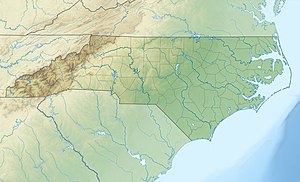Folkner Branch is a 3.89 mi (6.26 km) long 1st order tributary to the New Hope River in North Carolina. Folkner Branch joins the New Hope River within the B. Everett Jordan Lake Reservoir.
| Folkner Branch Tributary to New Hope River | |
|---|---|
| Location | |
| Country | United States |
| State | North Carolina |
| County | Chatham |
| Physical characteristics | |
| Source | Rocky Ford and Lick Branch divide |
| • location | about 3 miles west of Green Level, North Carolina |
| • coordinates | 35°47′02″N 079°57′50″W / 35.78389°N 79.96389°W[1] |
| • elevation | 315 ft (96 m)[2] |
| Mouth | New Hope River |
• location | B. Everett Jordan Lake |
• coordinates | 35°47′33″N 079°00′53″W / 35.79250°N 79.01472°W[1] |
• elevation | 216 ft (66 m)[2] |
| Length | 3.89 mi (6.26 km)[3] |
| Basin size | 3.15 square miles (8.2 km2)[4] |
| Discharge | |
| • location | New Hope River (B. Everett Jordan Lake) |
| • average | 3.79 cu ft/s (0.107 m3/s) at mouth with New Hope River[4] |
| Basin features | |
| Progression | generally west |
| River system | Haw River |
| Tributaries | |
| • left | unnamed tributaries |
| • right | unnamed tributaries |
| Waterbodies | B. Everett Jordan Lake |
| Bridges | Farrington Road |
Course
editFolkner Branch rises in a pond on the Rocky Ford and Lick Branch divide about 3 miles west of Green Level, North Carolina. Folkner Branch then flows westerly to meet New Hope River in the B. Everett Jordan Lake Reservoir in Chatham County.[2]
Watershed
editFolkner Branch drains 3.15 square miles (8.2 km2) of area, receives about 47.0 in/year of precipitation, has a topographic wetness index of 508.03, and has an average water temperature of 15.35 °C.[4] The watershed is 66% forested.[4]
References
edit- ^ a b "GNIS Detail - Folkner Branch". geonames.usgs.gov. US Geological Survey. Retrieved 2 December 2019.
- ^ a b c "New Hope Creek Topo Map, Chatham County NC (Green Level Area)". TopoZone. Locality, LLC. Retrieved 2 December 2019.
- ^ "ArcGIS Web Application". epa.maps.arcgis.com. US EPA. Retrieved 2 December 2019.
- ^ a b c d "Folkner Branch Watershed Report". Waters Geoviewer. US EPA. Retrieved 2 December 2019.

